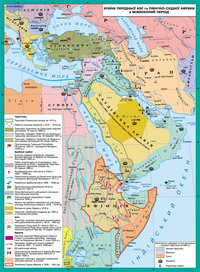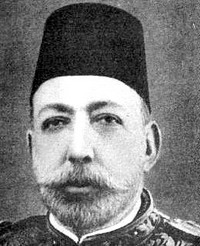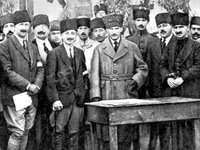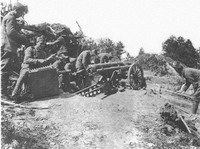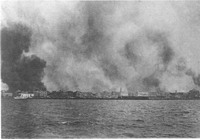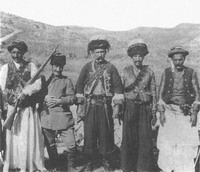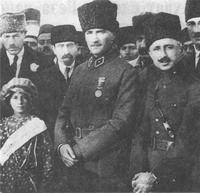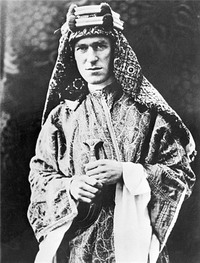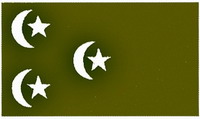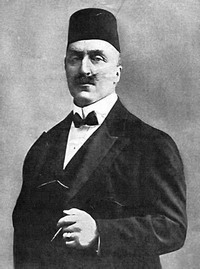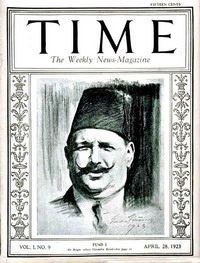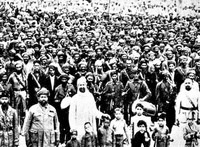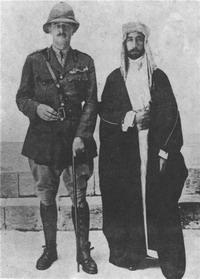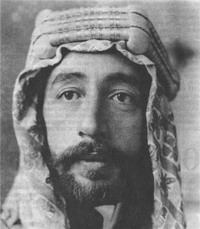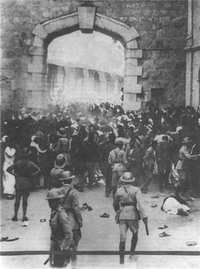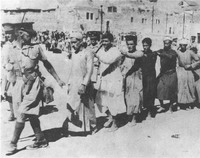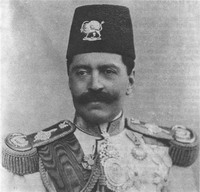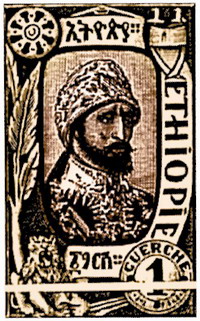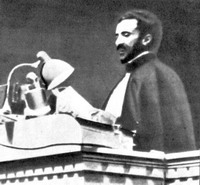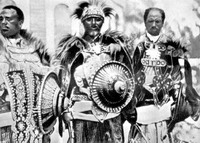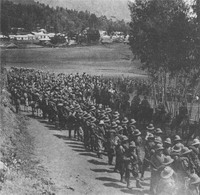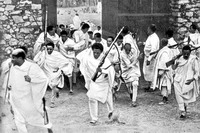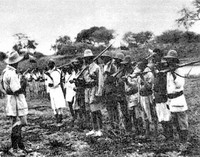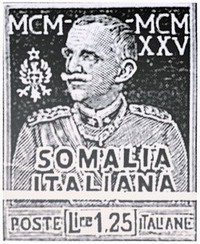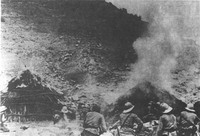creation of a national Turkish state
defeat in World War led to the collapse of the Ottoman Empire. England and France, rozchlenuvavshy Arab possession of the Ottoman Empire? wanted to do and actually Turkish provinces. Entente countries should control the Black Sea straits, the French occupied Cilicia, English - Istanbul, Italy and Greece have landed its troops in Asia Minor.
In response to this movement originated in Turkey for maintaining integrity as a nation state. Its head, General Mustafa Kemal. In neokupovaniy part of Turkey in Ankara was convened Grand National Assembly - Majlis , which created the government and the army began forming.
Meanwhile puppet sultan's government August 10, 1920 signed with Entente countries Sevrskyy peace treaty? which affirm the division of the country. Turkey lost all ownership in the Middle East. Greece switched part of the European possessions and Izmir in Asia Minor. On the eastern borders of Turkey formed the Armenian state. At the same surrender of the Turkish regime introduced that actually made the it into the semi. Kemal government rejected such a treaty. Then the support of Greek forces launched an offensive in England inland.
In the fight against the Entente Turkey found ally in Soviet Russia. In March 1921 both countries signed a treaty of friendship and brotherhood, according to the contract identified the Soviet-Turkish border. Turkey gained territory in the Caucasus that had previously belonged to Russia (Kara region) and Armenia, which in this way was divided and destroyed. Turkey has received financial and military assistance from RSFRR.
In October the same year a similar agreement was concluded with the Soviet Republics of the Caucasus, and in January 1922 signed a treaty with the USSR, whose delegation was headed by M. Frunze. Last M. Kemal helped plan the defeat of Greek forces.
In 1922, Turkish troops won the war. Entente was forced to sign a truce with the government of Kemal and it recognize it. Regulations Sevrskoho contract was revised. In 1923 he signed the Lausanne Treaty, under which preserved the territorial integrity of the country as a nation state.
Foreign policy caused the stabilization of domestic reform. Turkey became a republic (1923). Islam separated from the state, abolished the Caliphate (1924), introduced the Latin alphabet. All the Turks were obliged to take a surname. Mustafa Kemal Ataturk took the family name - father of the Turks. The country has banned polygamy, marriage was binding. The government began to support the national industry? focusing on developing importzaminnyh industries. After the crisis of 30's in the country introduced elements of planning the economy and created the public sector.
until the death of Ataturk in 1938, Turkey was very strong state. Ataturk became a model for nationalists Middle East and Central Asia.
Arab world
During the First World War, the British supported Arab revolt against Ottoman Empire. Important role in his organization played one of the most famous British spy Thomas Edward Lawrence ("Lawrence of Arabia"). Arabs supported the creation of their own country. But to realize this wish was never to. After the war the Arab lands that belonged to the Ottoman Empire? divided France and England. France invaded Lebanon and Syria, England established control over Iraq, Palestine and Transjordan. However in 1922 under pressure from powerful national liberation movement was forced to give England the independence of Egypt, however keeping a military presence in the country and control of the Suez Canal. Arab leaders, having before him the example of Egypt, tried to get rid of the rebellion by the new Europeans. However, anti-English rebellion in Palestine in 1922 and anti-French uprising in Syria in the 1925-1926 period were brutally suppressed.
Only Arabs Arabian Peninsula, led by Ibn Saud managed to create a state, which later known as Saudi Arabia (1932). In 1932 Britain was forced to recognize the independence of Iraq.
UK launched the resettlement of Jews on the territory of Palestine for the creation of their national communities, which led to a confrontation with the settlers by local Arabs. Thus, held the classical imperial policy of "divide and conquer !".
unsuccessful attempt to create a single Arab state has provided Arab nationalism anti-French and anti-English orientation. As a result, the 30-ies, especially during the Second World War in this region increased the influence of Germany and Italy.
Palestinian problem
idea of creating a national center of Jewish Austrian journalist suggested Theodore Herzl in the mid-nineteenth century. At the congress of the Zionist movement in Basel (Switzerland) in 1897, this idea has received the feasibility study. It was decided to create a Jewish state in Palestine. In this area of 25 thousand km2 planned to resettle 10 million Jews around the world. At first Zionists asked the Turkish sultan, under the rule which was in Palestine, to sell these territories, but he refused. Despite this, the Jews began to emigrate illegally to Palestine? which created a closed community, who were natural economy.
During World War sultan resorted to eviction of the Jewish population, accusing him of loyalty to the Entente. At the final stage of the war in 1917 Britain and France declared Foxtail Declaration, which dealt with the return of Jews to their historic homeland and the right to create a national center in Palestine. This declaration ushered in the new wave of migration.
in Palestine started to Jewish political and military organization. In 1922, Britain received the League of Nations mandate of Palestine. It immediately caused a revolt against British Arabs and Jews. At that time, Jews constituted 18% of the Palestinian population. Suppressed the uprising, but the tension in relations between Arab and Jewish communities and the colonial administration remained.
the end of 30's England promoted resettlement of Jews. When the ratio of Jewish and Arab population was threatening the stability of the English colonial empire, Britain banned the move. In 1936-1939, between Arabs and Jews there was a real war, while Arab and Jewish armed groups fought against the English. However, in Jewish political circles already firmly established the idea of establishment of their state. In Palestine the Jewish created "shadow" political structures - government, local authorities, armed groups. Under favorable conditions they had to declare state of Israel.
Arabs strongly opposed the creation of a Jewish state, which intensified inter-ethnic fighting in Palestine, which is still ongoing.
Iran in the interwar period
First World War and Revolution in Russia affected Iran. Trying to prevent the rise of national liberation movement and its spread to India, in 1918 the British began the occupation of all of Iran, invaded Baku (Azerbaijan) and Central Asia. Their goal was to finally enslave Iran and turn it into a base for armed intervention against Soviet Russia.
in Tehran created proanhliyskyy government headed by Ed Vosuhom Dohme. Having violated the constitution, without the Majlis, he signed the Anglo-Iranian agreement that gave control of the British advisers and instructors of the Iranian army, finance, road construction, foreign trade and other areas of social and economic life.
British resorted to immediately implement the agreement. Iranian finance subordinated E. Smith, English Advisor. British officers and instructors of the household in the Iranian army. Anglo-Iranian Customs Convention provided low rates for British goods and banned trade with Soviet Russia. With the country selling the contaminated food, resulting in higher food prices.
Strict control over vstanovyvsya socio-political and economic life. Any opposition to the agreements concluded prydushuvalysya force.
occupation aroused opposition. Especially it unfolded in the north. April 7, 1920 in Tabriz (Iranian Azerbaijan) rebellion broke out against the government and shahskoyi English, which is led by the Azerbaijani leader Sheikh Hiabani autonomists. He opposed the Anglo-Iranian bonded agreements required the strengthening of national independence, declaration of Iran, republic, democratic reform and autonomy for Azerbaijan. The rebels seized power in Tabriz and other cities and districts of Iranian Azerbaijan. In September 1920 British and shahski troops crushed the uprising. Sheikh Hiabani and many of his supporters shot.
In another northern province of Iran - Gilan June 5, 1920 was declared a republic and Hilyansku provisional revolutionary government headed by Tunb-khan. It includes representatives of various political movements and social groups - landowners, nationalists, democrats, communists. Conflicts between members of the government, and thus between the political forces they represent, led to internal weakness of the republic. Head of government Tunb Khan rejected the agrarian reform, which pushed the Communists and representatives of national minorities, including Kurds.
Proanhliyska policy was defeated, and the government Vosuha Ed Dohme resigned.
Shah was unable to give an elementary order in the country: in the north were torn Communists to power in the south hazyaynuvaly English, people suffered from gangs of looters? armed groups of nomads.
In such a situation, when the stake was the existence of the state, the son of peasants, the Persian Cossack officer Reza Khan led the campaign chotyrytysyachnoho detachment of Cossacks in the capital. In fact it was a coup. In February 1921 at the request of the rebels established a new government in which Reza Khan was appointed War Minister. Three months later he was removed from power Prime Minister and sent him from the country. All power ended up in the hands of Reza Khan, behind which was given to him Cossack division.
Reza Khan made a sharp turn in foreign policy the country: was eliminated political dependence on Great Britain, and British troops departed from Iran. At the same time it established relations with Soviet Russia (1921 agreement).
Reza Khan ruthlessly with the rebels and brought order in the country. Shah in this situation turned into a symbolic figure.
In 1925 the Majlis under the pressure of war, Reza Khan appointed Chief of unlimited authority. Majlis approved a decision on resignation Kadzharskoyi dynasty and the temporary transfer of power, Reza Khan, and to convene a Constituent Assembly that would determine the form of government in Iran. December 12, 1925 premiere of the fans elected Constituent Assembly proclaimed Reza Khan Crown Shah of Iran under the name Reza Shah-Pehlevi. Iran established a new dynasty.
Events in Iran 1919-1922 biennium can be estimated as the national revolution, whose main task was the elimination napivkolonialnoyi dependence, preserving the unity of the country and modernize it.
Reza-shah based on the experience of Turkey and U.S. advisers launched reforms aimed at modernizing the country. Financial reforms were provided profits from oil sales. The background of the country's economic independence was to be industrialization.
In 20-30's in Iran was held some reforms in the field of culture and life, introduced a secular school, a small number of female schools, open universities in Tehran and Agricultural Institute in Keredzhi. In 1935 he issued a decree on compulsory withdrawal of the veil, introduced European dress, lush feudal titles replace names. The influence of the clergy in social and political life was limited, was held calendar reform - instead of months it became the official solar calendar, the Gregorian calendar zaprovadzhuvavsya.
prydushuvalysya We send any statements of opposition, the peasant uprising.
In foreign policy in 30 years Reza Shah came closer to Germany, trying to find in contrast to the USSR and the UK.
In 1937 Iran signed an anti-Soviet pact Sadabadskyy, 1938 refused to conclude a new trade treaty with the USSR, which led to almost complete cessation of Soviet-Iranian trade, which amounted to almost 40% of Iran's foreign trade turnover . Iranian territory as a base for its aggressive plans of Germany tried to use.
Italo-Ethiopian War (1935-1936 biennium)
Top of the twentieth century. on the African continent remain only two independent states - Liberia and Ethiopia. Liberia zasnovaly former American slaves who decided to return to their historical homeland. But Ethiopia was one of the oldest Christian nations. At its head stood the emperor. In the late nineteenth century. Ethiopia defended its independence in a war with Italy, the 1920 signing of the League of Nations and became a full member sitovoho community.
In the mid 30's over the country again faces the threat of losing independence. Italian fascists, trying to prove the greatness of Italy, tried to create a colonial empire. The conquest of Ethiopia and the unification of all Italian possessions in the Horn of Africa would become the start of the implementation of these ambitious plans.
enlisting the connivance of England and France, being supported by Germany ("Pact of Four", 1934), Italy was prepared for war. In erythro and Italian Somalia, over five hundred thousandth army armed with tanks, guns and aircraft. Emperor Haile-Selassie of Ethiopia reformer and tried to win support in European countries, but in vain. October 3, 1935 Italian army invaded Ethiopia. However, developments are not followed by such a scenario, as expected in Rome. The people of Ethiopia made a stubborn resistance to the aggressors, and modern weapons 10000th Imperial Guard inflicted significant losses aggressor. Aggression Italy condemned the League of Nations and announced economic sanctions. These measures proved ineffective. U.S. and Britain declared its neutrality and refused to supply weapons to Ethiopia. Course of the war was resolved numerous technical advantages and the aggressor. Italy even invoked against the Ethiopians banned chemical weapons. In the decisive battle in 1931 is1936 differs Imperial Guards underwent total defeat. Italian army May 5, 1936 entered in Addis Ababa, the emperor and his family was forced to emigrate. In Rome, announced the creation of new colonies - Italian East Africa. However yefiopy not lay down their arms by expanding guerrilla war that ended the country's liberation by the British in 1941 war and occupation costly Ethiopian people: 400 tys.cholovik killed 300 thousand died of starvation and disease, 35 thousand were tortured in concentration camps.
 English
English
